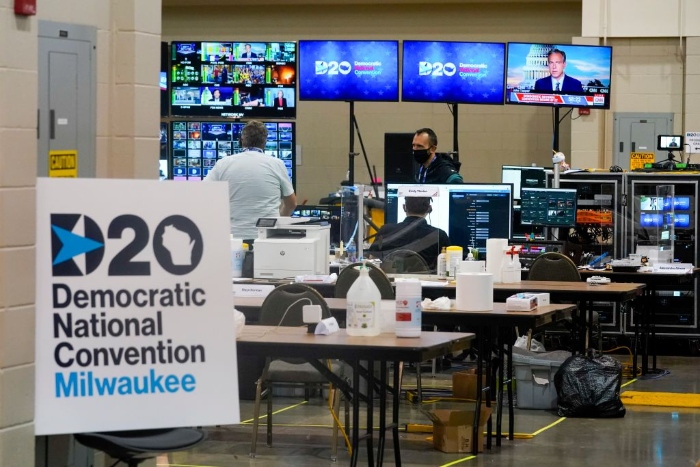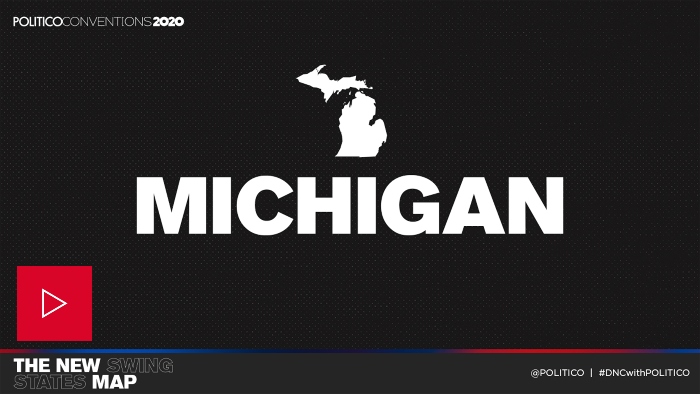 | |
Presented by Facebook | |
With help from Myah Ward NIGHT 2 —The Democratic National Convention rolls on tonight, with speeches from Bill Clinton and Jill Biden. Pregame starts with a live episode of “Four Square” at 8:30 pm ET. For live video, instant analysis, chats with POLITICO reporters and interviews with newsmakers, head to POLITICO’s convention hub: politico.com/dnc 'WE WALKED THE SAME STREETS' — When Kamala Harris became Joe Biden’s running mate, Padma Lakshmi posted a picture of herself and her mom on Instagram, next to a picture of Harris with her mother and sister. “The importance of having someone in the White House who looks like you cannot be overstated,” Lakshmi wrote. Like Harris, Lakshmi has grandparents who lived in the Besant Nagar neighborhood in Chennai in South India. And like Harris, Lakshmi grew up in California, though the “Top Chef” host moved to the U.S. as a child. South Asian culture has become only slightly more mainstream since Lakshmi — and your host — were children. (Turns out both of us spent last week bingeing on the Netflix reality show Indian Matchmaking.) Your host talked to Lakshmi about how she feels about the first woman of color on a presidential ticket. This conversation has been edited. What was your reaction when Biden picked Harris as his running mate? It was the first thing that has given me any excitement or made me engaged in the campaign for a really long time. From a personal point of view, I was really happy because the other major Indian Americans in politics that I know of on any national level are Nikki Haley and Bobby Jindal. Both are people who I do not agree with politically whatsoever. I’m happy also not because she’s Indian American, but because she’s African American and Indian American and the daughter of two immigrants. She ticks off a lot of boxes for the rest of us, the non white-Caucasian-male group. Do you feel like you and Harris share a lot of similarities? Harris’ grandfather lived literally around the corner from mine. So we walked the same streets. We went to the same beach. Our family doctor lives above their apartment, so I went to that apartment building where they live. We shopped at the same stores. The way I feel a kinship with her is through her history through her mother. Her mother came here as a grad student, but has a similar trajectory to my mother. I don't think that I can compare my experience in this country because while she is also half Indian, she experienced life as a Black girl and a Black woman, and that is very, very different from my experience. I would venture to say that she probably had it a lot harder than I did. What do you think it means for the South Asian community to have Harris on the ticket? I felt a huge swell of pride for every immigrant little girl. It would have never occurred to me that I could run for public office. It just was never in my radar. As immigrants you always have this feeling you were a second-class citizen. I can tell you that when I was even 20 or 30 I would have never thought that I would live to see the day that somebody who came from my grandfather’s neighborhood would be on a presidential ticket. I also think it’s great because a lot of Indians are very racist as we know especially against African Americans and darker skin people. The added benefit is that hopefully all these parents out there won't be so upset when their daughter brings home an African American boyfriend. What was the idea behind Taste the Nation, your new Hulu series? We’ve had a lot of vilification of immigrants and immigrant culture in the last four years coming out of Washington and I was sick of the rhetoric. You can tell a lot about a culture by looking at the way it eats. Taste the Nation is really a political show. It’s just masquerading as a food show. That is just an excuse to get to some deeper issues. In the first episode you speak with a Trump supporter — why did you think that was important to do? Maynard Haddad is emblematic of a lot of people in this country. A lot of people who are much more progressive, like myself, have those people in our families, in our friendship circles and at work. A lot of Indian families are Republican, so it was important to show that. Would you ever run for office? There are too many sexy photos of me on the internet for me to run. Welcome to POLITICO Nightly: Coronavirus Special Edition. Nightly is now an interview with Gail Simmons away from a Top Chef judges trifecta. Reach out rrayasam@politico.com or on Twitter at @renurayasam. | |
A message from Facebook: Facebook launches new Voting Information Center. Facebook is building the largest voter information effort in US history, starting with the new Voting Information Center, where you can find the latest resources about voting in the 2020 election. Our goal is to help register 4 million voters. Explore our new Voting Information Center now. | |
The control room where live feeds are managed is in operation for the virtual DNC convention at the Wisconsin Center in Milwaukee. | Getty Images | |
| |
TEACHERS UNIONS TEST GOODWILL — Teachers won newfound respect at the start of the pandemic as parents learned just how difficult it was to teach their kids at home. But teachers unions now risk squandering the outpouring of goodwill by threatening strikes, suing state officials and playing hardball during negotiations with districts, Megan Cassella, Nicole Gaudiano and Mackenzie Mays write. In California, unions fought Democratic Gov. Gavin Newsom hard for teacher protections and job security as campuses were shuttered, and are demanding tax hikes to fill education budget shortfalls. In New York City, a caucus within the United Federation of Teachers called on the union to threaten “severe disruption” if the governor and the mayor implement what they describe as “reckless reopening plans.” The Florida Education Association is in a legal battle with state officials to try to overturn an order requiring schools to physically open five days a week or risk losing state funding. Safety concerns have been at the heart of union objections to reopening as they confront teachers getting sick or even dying from Covid-19. Many union leaders have worked collaboratively with management on contracts and reopening plans, and they have spent months calling for additional federal money to secure personal protective equipment and allow for socially distanced instruction. But more recently, a coalition including some local unions has pushed further, laying out demands such as police-free schools, a cancellation of rents and mortgages, and moratoriums on both new charter programs and standardized testing. Those threats and demands have angered some lawmakers, school districts, parents and conservative groups who argue that teachers are taking advantage of the chaos the pandemic has caused to push policy changes the unions have wanted for years. | |
PLUG IN WITH PLAYBOOK AT THE DNC : Join POLITICO Playbook Co-authors Anna Palmer and Jake Sherman from Aug. 18 to 20 for "Plug in with Playbook," our new political show making its virtual debut at this year's conventions. Get the latest developments on presumptive nominee Joe Biden's campaign, analysis of down-ballot races, a look at this cycle’s swing states, along with other election-related updates. Featured guests include DNC chair Tom Perez, convention CEO Joe Solmonese, Biden campaign senior adviser Symone Sanders, Sen. Tim Kaine (D-Va.) and others. REGISTER HERE. | |
| |
NEW DEMOCRAT GROWS OLD — Nightly’s Myah Ward spoke with founding editor John Harris about Democrats’ relationship with Bill Clinton after #MeToo and the rise of Bernie Sanders, and what Biden’s nomination means for the future of Clintonism. This conversation has been edited. The Democratic Party has a more complex relationship with Bill Clinton than it did four years ago. His reputation is considerably depressed over its high point when he left office. Close to 75 percent of Americans approved of his job performance, and that was overwhelmingly high among Democrats. And so he's roughed up around the edges, for two reasons. One, ideologically, the party has moved to a good bit left of what his record was in the 1990s. But I’d make clear that’s the record. That’s not necessarily what Bill Clinton himself would have wished for, if he wasn't governing against a Republican Congress. And it doesn’t necessarily reflect how he, like the party, has moved left in the 20 years since then. But ideologically his record is not progressive enough for today's generation of progressives. And obviously the #MeToo allegations. Sexual indiscretion haunted his political career even before the presidency. It haunted it during the presidency. And I think in the #MeToo context, people take an even more grave view of those weaknesses. So his reputation is down, but it’s not out. I think he’s still respected and admired by a large number of Democrats. What does the nomination of Biden mean for Clintonism? If you separate Clintonism from Bill Clinton, it involved trying to find a progressive center. It involved not defying institutions and the established order, but reforming institutions and reforming the political status quo. And doing it from a position of respect, rather than contempt. Certainly not the contempt that Donald Trump has toward establishment politics, but I’d say also the contempt of a different sort on the left. I think Joe Biden really comes from that same place as Clinton. I don’t think Joe Biden is as fluent and articulate of a politician as Bill Clinton, and I don’t think he’s got the kind of robust, fertile, creative policy mind that Bill Clinton at his best had. But fundamentally, I think Biden is a contemporary version of Clintonism. What parts of Clinton’s legacy do you think the new generation of Democrats will carry forward? There’s a fundamental optimism about Bill Clinton’s approach to life and his approach to politics that doesn't reflect the country’s mood at the moment. He acted on the belief that we’ve got problems, but we’re solving them. That the future is going to be better than the present if we work hard. His phrase that there’s nothing wrong with America that can't be solved by what’s right with America. That was the emblematic Clinton line that really does echo for me. Clinton spoke and practiced the politics of persuasion. He believed if reasonable people could listen to reasonable argument, they could be moved. That’s distinct from the politics of mobilization: “I just want to energize people who share my grievances and get them as jacked up as I can. I’m not really trying to change minds. I’m just trying to mobilize minds that are already sympathetic to me.” One doesn't need to excuse the inexcusable in Bill Clinton’s personal life or embrace a set of issue positions that were designed to solve the problems of the 1990s. You can separate yourself from Bill Clinton the person and Bill Clinton the politician, and still see that there was something in his approach to politics that has value. PURPLE REIGN — During the next two weeks, POLITICO reporters will examine the six key states that most observers think will decide who will win November’s election. The series starts with Michigan, and senior politics editor Charlie Mahtesian, Michigan’s own Tim Alberta and Eugene Daniels dive into the state’s Black voter intensity, white working class loyalty to Trump and suburban voters’ move away from the GOP. | |
Tune in to “Plug in with Playbook” on Wednesday at 9 a.m. ET when Charlie and Holly Otterbein take a look at Pennsylvania. Mea culpa: In Monday’s newsletter, we misidentified who Jeff Weaver was assisting with DNC speechwriting. Weaver helped Sen. Bernie Sanders write his Monday night remarks. | |
|
|
|




No comments:
Post a Comment
Note: Only a member of this blog may post a comment.